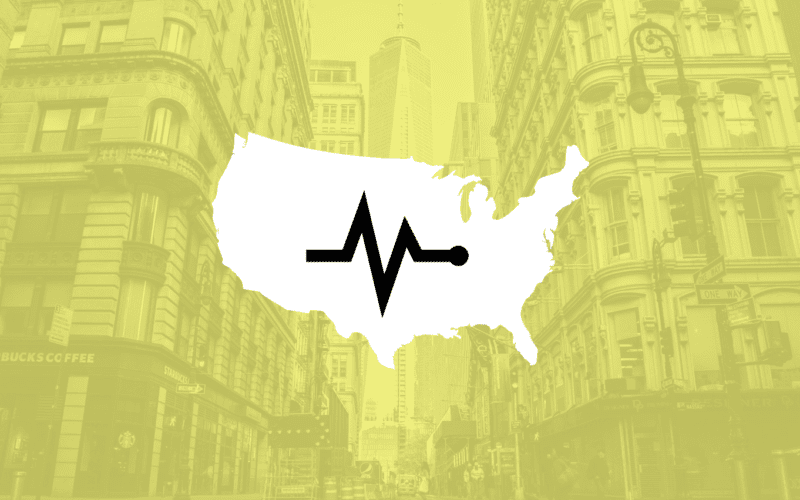Registered Asian American voters are highly enthusiastic about the November election and continue to trend left as early voting ramps up across the country, according to a new survey conducted by researchers at AAPI Data, APIAVote, and Asian Americans Advancing Justice | AAJC.
Tuesday’s release of the highly-anticipated 2020 Asian American Voter Survey, one of the only national pre-election surveys that collects disaggregated data on Asian American voters, provides new insights on the rapidly growing voting bloc’s positions on issues like health care, education, and the economy.
“Culturally and language-wise, it may differ, but when it comes to the values—and you can see it in the data itself—they are trending a lot more progressive,” APIAVote Executive Director Christine Chen said at a press briefing hosted by the National Council of Asian Pacific Americans on Tuesday. “That has been consistent year after year.”
Researchers collected responses from 1,569 registered Asian American voters of Chinese, Indian, Filipino, Japanese, Korean, and Vietnamese descent. The interviews, which took place from July to September, were conducted both online and over the phone and had several language options, including English, Chinese, Korean, and Vietnamese. The data is weighted across state and ethnicity. Voters from California are not included in this sample, however; AAPI Data published a separate set of findings focused only on the Golden State.
“The focus with this data is to understand how to best advocate for our community,” said John C Yang, president and executive director of Asian Americans Advancing Justice | AAJC.
Key findings
Among the survey’s key findings surrounding the 2020 election and voting issues:
- PARTY CONTACT REMAINS ABYSMAL: A vast majority of respondents reported that they had not been contacted by either of the two major parties, in line with previous survey results. It doesn’t mean AAPI voters aren’t energized to vote, however. “People who haven’t really been engaged before are understanding more and more the need to talk about, engage, and organize … any way they can,” said Alvina Yeh, executive director of the Asian Pacific American Labor Alliance.
- HOW THEY’LL VOTE: A majority of Asian American voters reported that they plan to vote by mail or absentee. 17% indicated they would vote early in person, and 27% said they would vote in person on Election Day.
- MOST VOTERS BACK BIDEN: Asian American voters who have made up their minds about their 2020 vote back former vice president Joe Biden over President Donald Trump by a nearly 2-to-1 margin (54% to 30%). 14% remain undecided.
- TRUMP SEES HIGH UNFAVORABLES: Most Asian American voters view Joe Biden very or somewhat favorably, while more than half view Trump unfavorably (including 47% very unfavorably). Chinese American voters were the least likely to have a favorable opinion of Trump.
- PARTY IDENTIFICATION: While most Asian Americans think of themselves as Democrats, more than 30% said they identified as independents or “other.” Indian Americans voters were the most likely to identify as Democrats, while Vietnamese American voters were the only significant group to favor Trump over Biden.
- IN FOCUS: Vietnamese Americans voters were also the only group more likely to back Republican candidates in 2020 House and Senate races. They scored the GOP higher on a host of issues, including education, health care, racism and discrimination, and immigration.
- VOTER PRIORITIES: The economy, health care, and education remain top voter concerns, with Republicans slightly favored on the economy and Democrats holding strong advantages on all other issues.
- XENOPHOBIA: More than 75% of Asian American voters expressed worry about anti-Asian bias during COVID. While Asian Americans generally feel that there is anti-Asian bias in society today (72% overall), respondents tended to believe that Black (49%) and Muslim (42%) people experience more severe forms of discrimination compared to Asian Americans (23%).
Policy preferences
Despite significant diversity by socioeconomic status, researchers found that registered Asian American voters had “remarkable solidarity” and leaned progressive on a range of issues.
- GOVERNMENT SPENDING: Asian American voters across all demographics strongly favor bigger government and more services (43% vs. 19%).
- IMMIGRATION AND HEALTHCARE: Asian American voters tend to favor healthcare for immigrants, regardless of their legal status (55% overall); they also heavily favor providing undocumented immigrants a pathway to citizenship (59% overall).
- CLIMATE CHANGE: Asian American voters heavily favor the passage of stronger legislation for controlling climate change and global warming (77% overall).
- GUN LAWS: Asian American voters across the board heavily favor stricter gun regulations in the U.S. (81% overall).
- SAFETY AND LANGUAGE ASSISTANCE: More than half of Asian American voters worry about safety at the polls and language assistance availability (52% overall). Only a minority of Vietnamese (46%), Korean (44%), and Chinese (37%) individuals are concerned about election interference.
- AFFIRMATIVE ACTION: Despite some Chinese Americans groups’ strong opposition to affirmative action, they are more than twice as likely to support the Democratic Party on education than they are to support Republicans. Asian American voters overwhelmingly support affirmative action (70%), with the most support coming from Indian Americans (86%). According to Yang, Asian Americans have seen an increase in support for (and decrease in opposition) to affirmative action over the years.
- CIVIL RIGHTS: Asian Americans across the board agreed with the statement that the government should do more to provide Black people with equal rights as white people (63% overall). “People have these stereotypes of these issues not being Asian American issues, … [but] Asian Americans are firmly on the side of racial justice with our Black brothers and sisters,” said AAPI Data Founder and Director Karthick Ramakrishnan.
- POLICE FUNDING: Asian American voters overall tended to agree that “local governments should shift spending from law enforcement to programs” (59%). However, only a plurality of Vietnamese (44%) and Japanese (47%) Americans supported reallocation.









